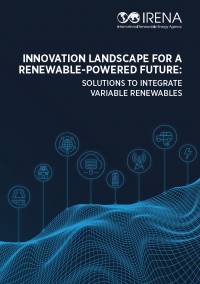IRENA: Innovation landscape for a renewable-powered future - February 2019 - eng (pdf)
The integration of solar and wind power poses specific challenges as system operators pursue low-carbon investments and long-term energy sustainability. As these variable renewable energy (VRE) sources reach high shares of power generation, power systems must be increasingly flexible to maintain the balance of supply and demand over each day or year.
In response, policy makers and system operators around the world seek new enabling technologies, business models, market designs and system operation measures, aiming to make optimal use of VRE in this evolving landscape. Innovation initiatives, therefore, look for solutions that boost system flexibility.
The International Renewable Energy Agency (IRENA) has analysed the innovation landscape for VRE integration, mapping and categorising innovative solutions and on-the-ground examples.
The resulting report aims to provide a guide to current innovations, either under development or already in use, in different settings across the globe.
The resulting framework is meant to support informed decision-making on the best solutions for each different power system. The report concludes with an eight-step plan for power-sector transformation:
- Anticipate future power system needs
- Adopt a systemic approach
- Foster learning by doing
- Account for changing roles and responsibilities
- Create synergies through sector coupling
- Make market-design innovation a priority
- Turn smart innovations into smart solutions
- Adopt an open and co-operative approach to innovation
Additional briefs are available on key innovations. These include:
- Aggregators – a new business model to optimise the use of distributed energy resources (DERs);
- Blockchain – an enabling technology for “smart contracts” that enhance system intelligence, transparency and automation;
- Future role of distribution system operators (DSOs) – a system-operation innovation that boosts local power generation and consumption;
- Time-of-use tariffs – a market-design innovation that saves customers money while strengthening the overall power system.
Дополнительная информация
- Серия: Международные организации / IRENA
- Год: 2019
- Месяц: 2
- Источник: IRENA - International Renewable Energy Agency


































